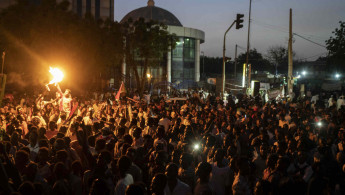Sudanese military and opposition denounce protest against Islamist party
Sudanese protest leaders on Sunday held talks with the country's ruling military transitional council, after the military condemned an attack on an Islamist party close to former president Omar al-Bashir.
Dozens of protesters gathered on Saturday outside a building where the Popular Congress Party (PCP) was holding a meeting, chanting "No place for Islamists."
The party was established by Hassan al-Turabi, the Sudanese Islamist leader who played a key role in the 1989 coup that brought Bashir to power.
Turabi had previously led the National Islamic Front (NIF) that dominated the Sudanese regime until the later 1990s, when Bashir asserted power over the party, renamed to the National Congress Party.
Although the PCP has ostensibly operated as an opposition group, protesters who oppose the nearly 30-year rule of the Islamist regime cannot ignore the party’s links to Turabi and the NIF.
The NIF is accused of perpetrating a variety of human rights abuses and war crimes. It also introduced conservative Islamist legislation into the country, such as the authority of morality police to arrest and sentence women to lashes for "immodest" dress.
At least 64 PCP members were wounded in "clashes" with the protesters, party leader Idriss Suliman said according to Sudan's state news agency SUNA.
The army arrested 134 people, but all were released on Saturday night, according to Sudan Tribune.
Both the transitional military council and the Alliance for Freedom and Change (AFC), an opposition umbrella group which is seen to represent the views of protesters, condemned the attack.
Although the AFC suspended talks with the military a week ago, it resumed negotiations on Wednesday when three members of the transitional military council close to Bashir resigned.
Sudan's military took power in a coup earlier in April, overthrowing Bashir after months of mass, popular protests against his regime.
Protesters have for weeks called for a civilian-led transitional government, while the military has said it will maintain power for a period of two years.
The transitional military council and the AFC on Saturday announced they had agreed to set up a transitional council composed of both civilian and military representatives which will replace the current military council.The military also agreed to the protesters' demand of establishing a civilian government which will run day-to-day affairs.
"What happened yesterday is a step to have a civilian authority," demonstrator Mohamed Amin told AFP on Sunday.
"We are happy about the progress in the talks, but we are still waiting for the composition of the council and the civilian government."
While the AFC is still in talks to decide the composition of the council, activists have speculated that it will contain eight civilian members and seven military representatives.





 Follow the Middle East's top stories in English at The New Arab on Google News
Follow the Middle East's top stories in English at The New Arab on Google News
![Both Hamas and the Palestinian Authority welcomed the ICC arrest warrants [Getty]](/sites/default/files/styles/image_330x185/public/2024-11/GettyImages-2178351173.jpg?h=199d8c1f&itok=TV858iVg)

